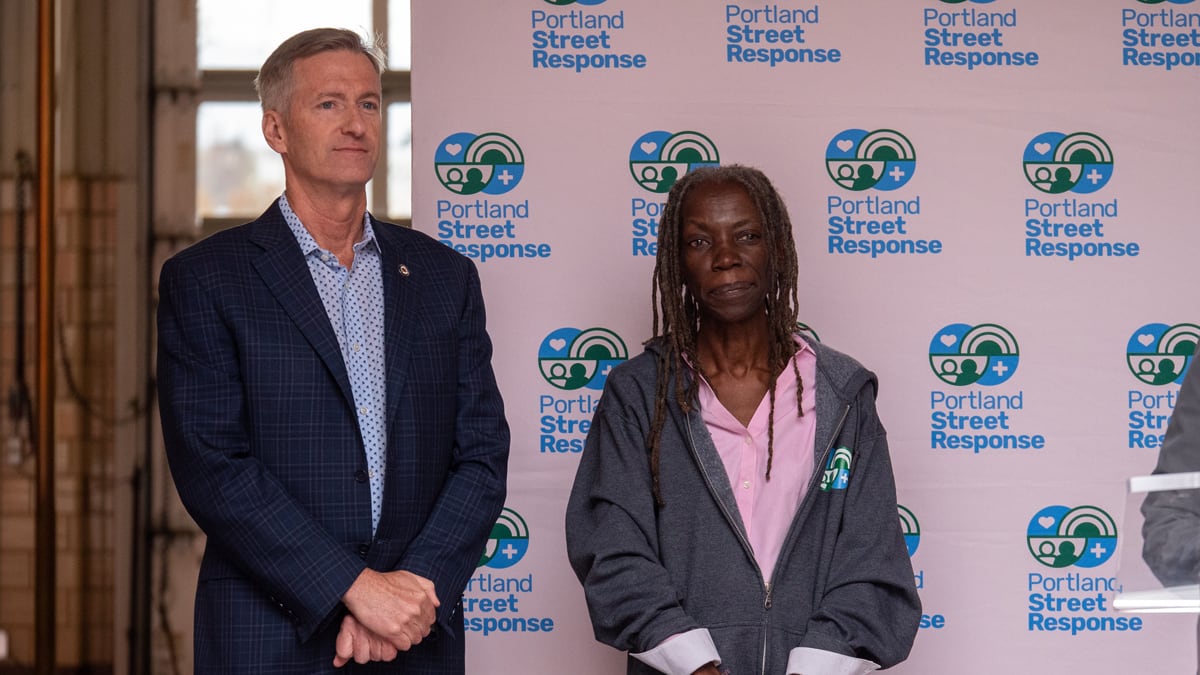More than a year after the launch of its pilot program in the Lents neighborhood last February, Portland Street Response is now operating citywide.
“This is a historic day in the city of Portland,” said Commissioner Jo Ann Hardesty, who championed the program’s establishment and expansion. “As of today, Portland Street Response will no longer have geographic boundaries in the city of Portland. We are now operating citywide, and that is the reason we are celebrating today.”
PSR currently has 20 full-time employees, said program manager Robyn Burek. The team, which includes crisis medics and licensed mental health clinicians, represents Portland’s first citywide alternative to armed police response. The program drew inspiration from the nationally recognized CAHOOTS program in Eugene, which operates through a nonprofit model rather than local government.
Monday’s announcement lands weeks before the one-year anniversary of the shooting death of Robert Delgado by a Portland Police Bureau officer. On the morning of April 16, 2021, Portland police responded to Lents Park after a resident called the city’s Bureau of Emergency Communications to report a man quick-drawing a handgun “like James Bond or like a cowboy.” Once police shot Delgado, minutes after arriving on the scene, they determined the gun was a replica.
That call was located squarely within PSR’s pilot area, but the team was not dispatched in part because its hours of service began at 10 am—about 30 minutes after the call came in. It’s also worth noting that BOEC operators had initially marked the call as not mental health related.
During Monday’s press conference, Mayor Ted Wheeler said he could not comment specifically on the death of Delgado, but that the city was now better equipped to respond to mental health crisis calls than it was a year ago.
“I do believe with the establishment of Portland Street Response and now with the citywide rollout of Portland Street Response, we are in a better position to be able to appropriately manage mental health crises on the streets. That was the intention of the program,” Wheeler said. “From the city’s perspective, I think this is a huge step forward in terms of being able to address individuals who are experiencing crises on our streets.”
Portland Street Response is not yet operating around the clock, however.
Currently, its hours are 8 am to 10 pm, seven days a week. The program had planned to expand to 24/7 coverage by the summer. Now, according to spokeswoman Caryn Brooks, PSR intends to increase staffing during daytime and early-evening shifts in the summer, and then move to 24/7 coverage by October—should the funding be approved. That’s in response to data that showed most low-acuity calls PSR responds to occur during the daytime, Brooks said.
In its submission request for the upcoming budget cycle, Portland Street Response is asking for $3.7 million to convert limited-term staffing positions to full time, and to create 34 new full-time employee positions. That request, if approved, would bring the program up to 58 full-time employees—enough for a 24/7 expansion, according to budget documents.
That also means expanding to 24/7 coverage requires buy-in from the Portland City Council.
“While we are excited by our progress, our mission is not complete,” Commissioner Hardesty said. “To get to 24/7 citywide coverage, I will need the support of my colleagues in this next budget cycle to fully-fund the next expansion of Portland Street Response.”
The City Council voted unanimously in the fall to approve PSR’s request for roughly $1 million to fund about a dozen full-time positions and allow the program to purchase more vehicles. But during the prior budget vote last May, the City Council voted 3-2 against Hardesty’s request to allocate $3.6 million in ongoing funds to the program.
Burek said Monday that it’s “a little premature at this point” to determine whether PSR has full support from the City Council in its latest budget request.
In its first year, PSR responded to 925 calls, which averages out to 2.5 calls per day, according to a review by the City Budget Office. That average increased to 3.9 calls per day once the pilot’s geographic boundary grew from five to 36 square miles.
Today’s citywide expansion includes 145 square miles. According to budget documents, Portland Street Response anticipates responding to 82 to 137 calls per day if operating citywide 24/7.
